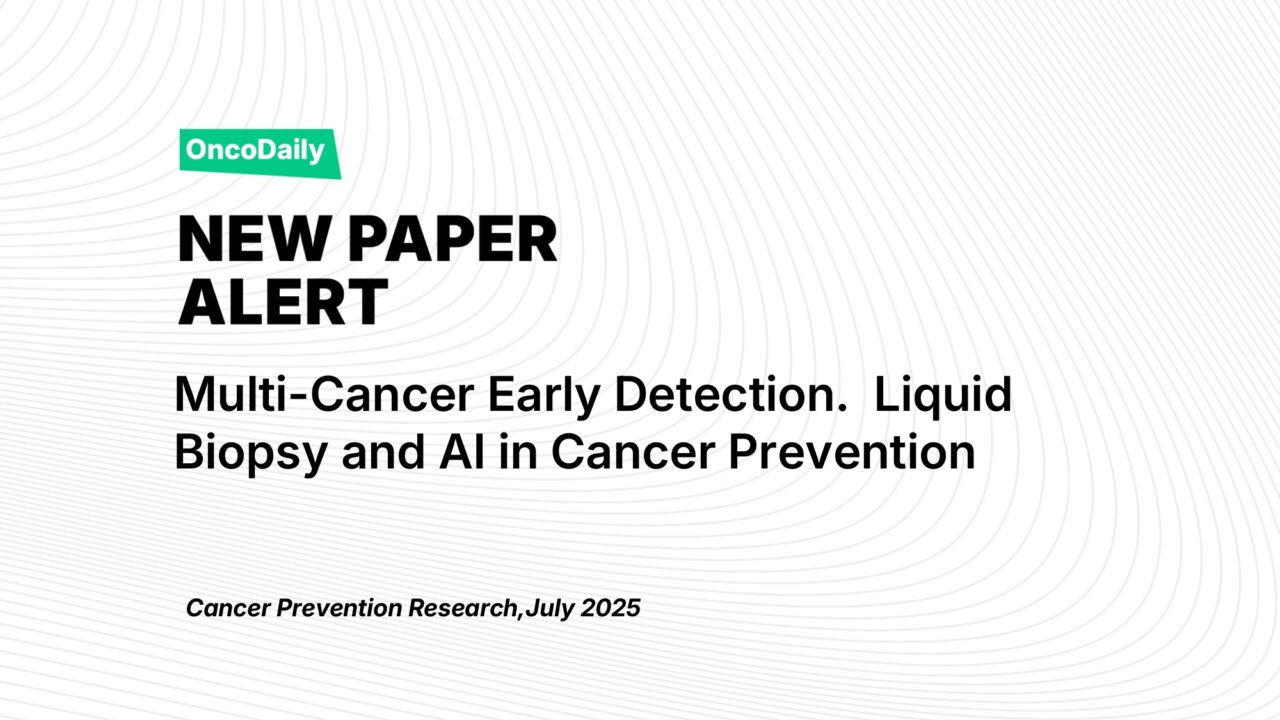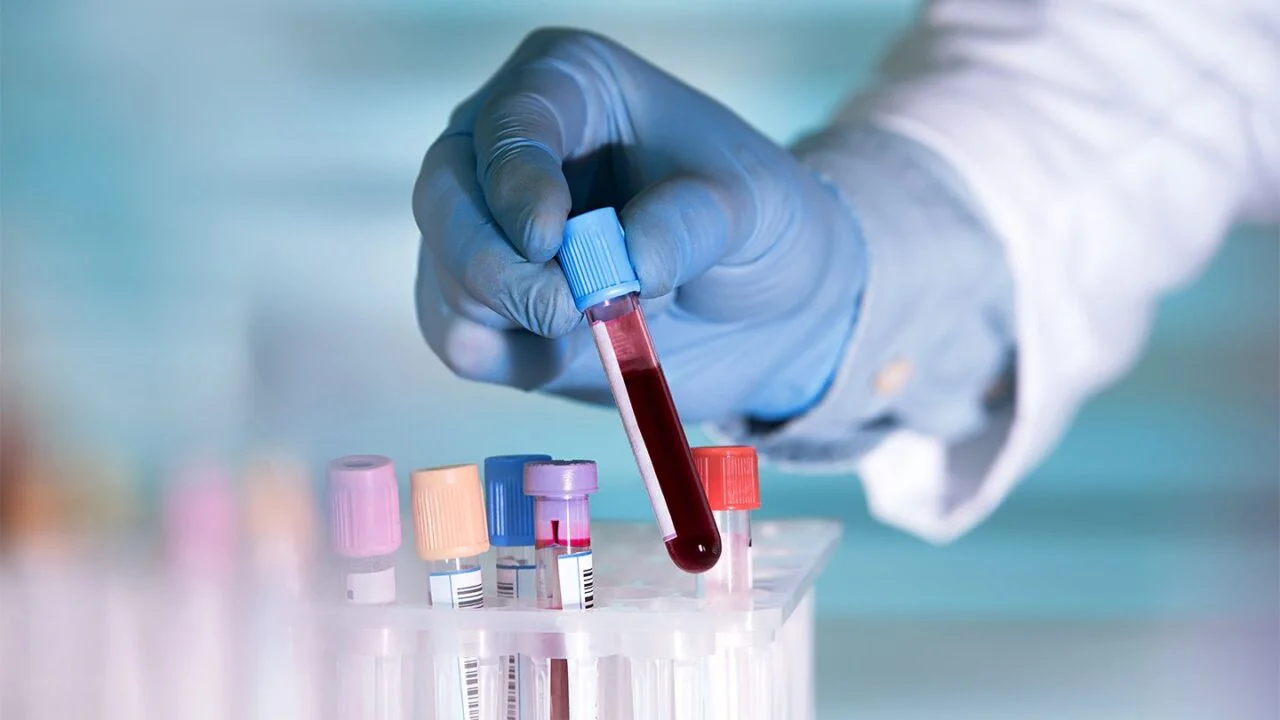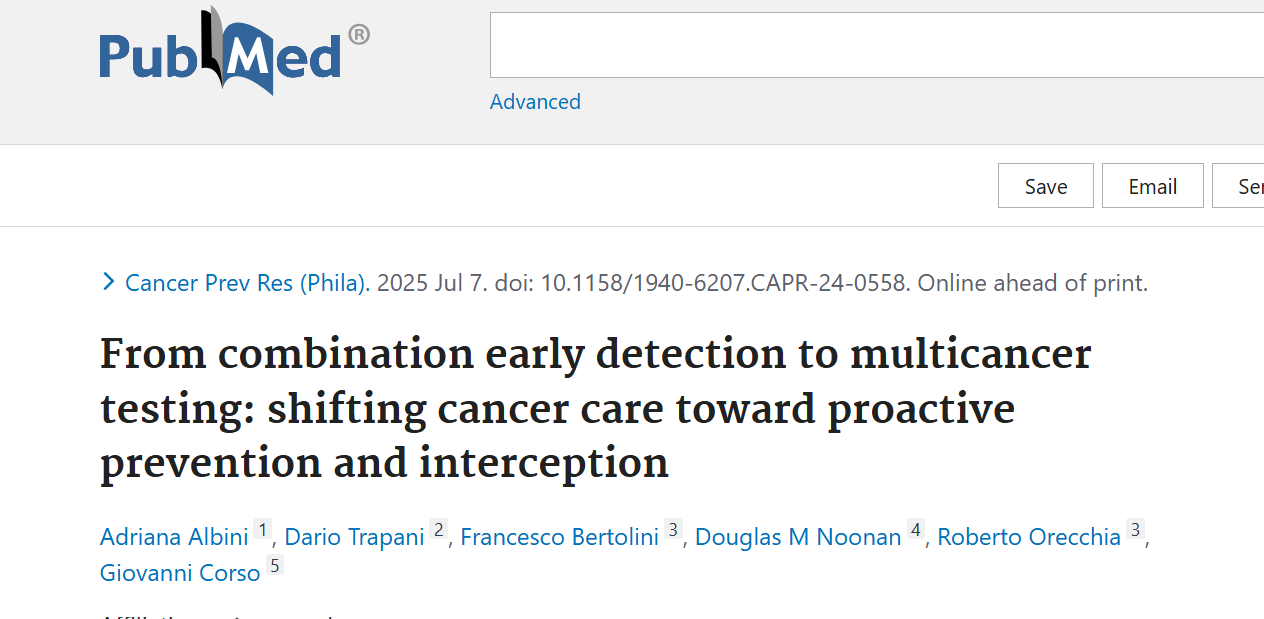
New Paper Alert: Advancements in Multi-Cancer Early Detection. The Role of Liquid Biopsy and AI in Cancer Prevention
Multi-cancer early detection (MCED) is revolutionizing the way we approach cancer prevention by enabling the identification of multiple cancers from a single blood sample. This groundbreaking technology integrates various molecular, immune, and metabolic markers to detect cancer at its earliest, most treatable stages. Unlike traditional cancer screenings, which are often organ-specific and limited to certain types of cancer, MCED assays provide a broader and more comprehensive approach.
Liquid biopsy, a non-invasive technique, plays a crucial role in this paradigm by analyzing circulating tumor cells, DNA, RNA, immune cells, and other biomarkers present in the blood. When combined with cutting-edge technologies such as artificial intelligence (AI) and metagenomic profiling, MCED promises not only to detect cancer early but also to provide personalized risk assessments, paving the way for more proactive and individualized prevention strategies. This shift from reactive to proactive cancer care marks a significant step forward in oncology, focusing on early detection and interception to improve patient outcomes.

Title: From combination early detection to multicancer testing: shifting cancer care toward proactive prevention and interception
Authors: Adriana Albini , Dario Trapani , Francesco Bertolini , Douglas M Noonan , Roberto Orecchia , Giovanni Corso
Publishesd in Cancer Prevention Reaserch, July 2025

Background
The early detection of cancer is crucial for improving patient outcomes, as identifying tumors at their earliest stages allows for the interception of pro-malignant processes and provides a window for more effective treatment. Traditional cancer screening methods often focus on specific cancers, but advances in molecular profiling are pushing the boundaries of early detection.
Recent technological advancements, including liquid biopsy, metagenomics, and multi-cancer early detection (MCED) assays, offer a promising shift towards identifying multiple types of cancer with a single blood sample. These innovations go beyond genomics to include immune dysregulation, metabolic shifts, and microbiota imbalances, facilitating a more holistic and integrated approach to cancer prevention.
Study Design and Methods
The article reviews cutting-edge technologies that enable multi-cancer early detection and their potential application in clinical settings. Liquid biopsy is highlighted as a non-invasive method that analyzes circulating tumor cells, DNA, RNA, immune cells, extracellular vesicles, and proteins from a single blood sample.
The focus is on how these molecular markers can be used to detect cancer earlier than traditional imaging techniques. Additionally, metagenome analysis is introduced as a tool for profiling gut microbiota, which may play a role in cancer risk. The article also discusses the role of artificial intelligence (AI) in integrating molecular, immune, and metabolic data to develop personalized risk profiles for cancer.
This article does not describe a single study but instead provides an overview of various technological advancements in multi-cancer early detection. It emphasizes the use of liquid biopsy in combination with other techniques like AI and metagenomics to detect cancer at its prodromic stage. The approach discussed represents a shift from single-cancer screening to a comprehensive, mechanism-based screening strategy. The author also discusses how cancer interception strategies—such as lifestyle modification, drug repurposing, and targeted chemoprevention—can be employed based on early detection results.
Results
The results of these technological advancements have been promising. Liquid biopsy has demonstrated high sensitivity in detecting cancer-related biomarkers and allows for monitoring tumor dynamics over time. For example, studies have shown that liquid biopsy can detect circulating tumor DNA (ctDNA) in early-stage cancers, potentially leading to earlier intervention.
Moreover, the incorporation of metagenome analysis and AI-driven data integration has enhanced the accuracy of early detection, improving the ability to capture subtle molecular changes that may precede full-blown malignancy. A key result of combining liquid biopsy with AI is the generation of personalized cancer risk profiles, which are tailored to the unique molecular, immune, and metabolic signatures of an individual, leading to more effective prevention strategies.
Insights
- Liquid biopsy: Proven to be an effective non-invasive method for detecting cancer biomarkers and monitoring disease progression, it is especially useful for cancers that are difficult to detect with traditional imaging methods.
- Metagenomics: Profiling gut microbiota can reveal microbiota imbalances that may influence cancer risk, providing an additional layer of understanding in cancer detection.
- AI and personalized risk profiling: Artificial intelligence is playing an integral role in integrating molecular, immune, and metabolic data to create more precise and personalized cancer risk profiles, paving the way for tailored prevention strategies.
- Multi-cancer detection: MCED assays, which combine data from multiple sources, enable the detection of signals from several types of cancer with a single blood test, offering the potential for earlier, more comprehensive cancer detection.
Key Takeaway Messages
- Advances in liquid biopsy are revolutionizing early cancer detection by allowing clinicians to identify genetic, immune, and metabolic markers in a non-invasive way.
- Metagenomic profiling offers insights into the gut microbiota’s role in cancer risk, further expanding the scope of early detection.
- Artificial intelligence is a powerful tool that integrates complex molecular data to create personalized cancer risk profiles, offering a more tailored approach to prevention.
- Multi-cancer early detection (MCED) assays are emerging as a promising approach for detecting multiple cancers from a single blood sample, which could lead to earlier diagnosis and improved survival rates.
You can read the full abstract here
Written by Sona Karamyan, MD
-
Challenging the Status Quo in Colorectal Cancer 2024
December 6-8, 2024
-
ESMO 2024 Congress
September 13-17, 2024
-
ASCO Annual Meeting
May 30 - June 4, 2024
-
Yvonne Award 2024
May 31, 2024
-
OncoThon 2024, Online
Feb. 15, 2024
-
Global Summit on War & Cancer 2023, Online
Dec. 14-16, 2023
